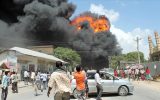by Azeez Adeniyi
Vice President Yemi Osinbajo on Thursday said most African countries find it difficult to trace and recover stolen money.
Osinbajo said this in his remarks at the anti-corruption and integrity forum of the Organisation for Economic Cooperation and Development in Paris.
He said such difficulty was due to lack of the adherence to the rules promoting transparency in international banking and financial systems.
He said, “Tracing, freezing and return of stolen assets has proved in many cases to be exceptionally difficult for most African countries.
[InCaseYouMissedIt: Corruption fuelled Boko Haram insurgency in Nigeria]
“We, in Nigeria, have seen just how difficult it is to get back stolen assets from the international financial system, such as banks that ought not to have received those funds in the first place if even the most routine questions were asked.
“A robust global framework on repatriation of stolen assets which ensures quick restitution to victim countries is long overdue.
“There is a consensus that corruption and illicit financial flows out of Africa, inexorably delay the attainment of development goals, worsen practically all human development indices and trap the majority of her people especially the most vulnerable in a cycle of misery.
“Only a united global action has the power to reverse this trend. We respectfully urge that this power be exercised more vigorously and without further delay.”
He said corruption was one of the greatest challenges of development.
Osinbajo said, “There is now hardly any credible opposition to the notion that corruption and illicit financial flows constitute, perhaps, the gravest challenge to development. And this is especially true of developing countries.
“Besides, we have seen in Nigeria, in recent years, how corruption directly fuelled the insurgency in the North-East. And how, in turn, that has led to one of gravest humanitarian disasters in the world.
“Also, the adverse implications for education, health care, social services, infrastructure and, indeed, quality of life no longer require making a case.
“Corruption and illicit financial flows are different. But they really must be twinned. This is because for practical purposes, it is an eminently more sensible approach to treat most of the sources of illicit financial flows as corrupt activity within a broader use of the term.”
















